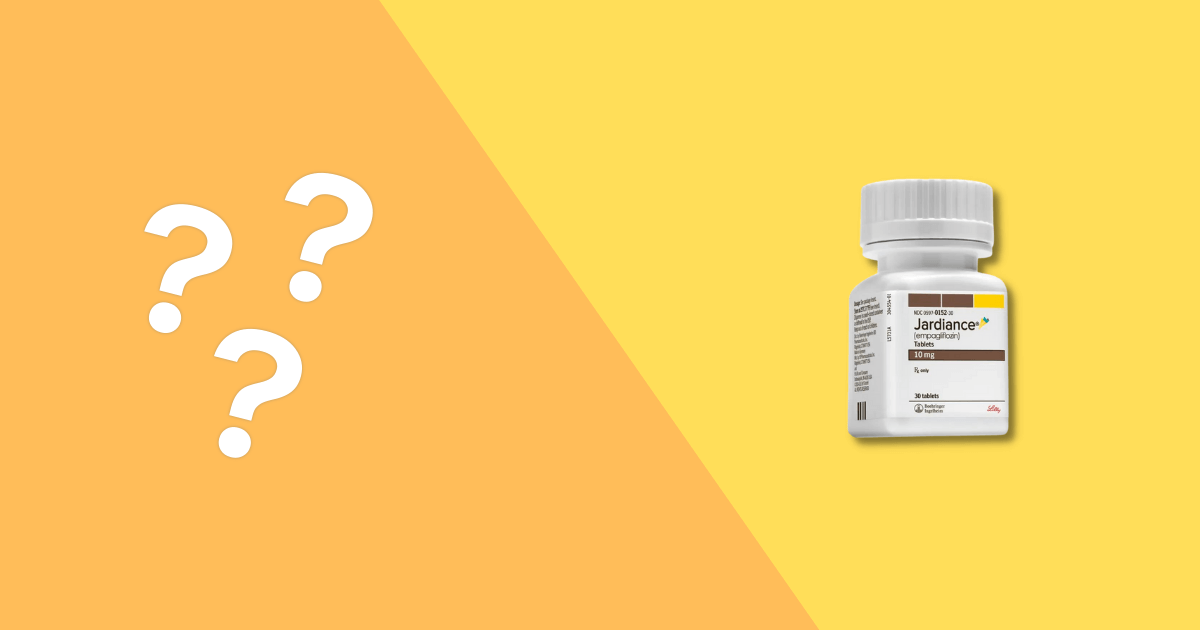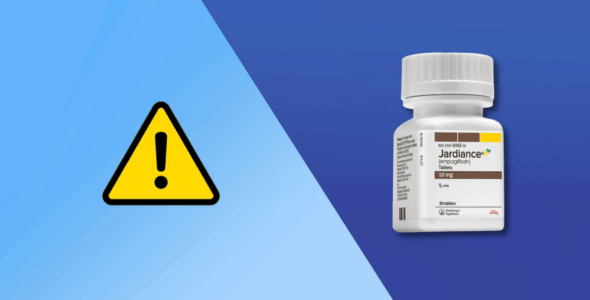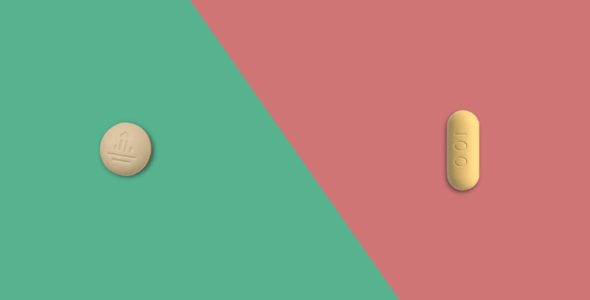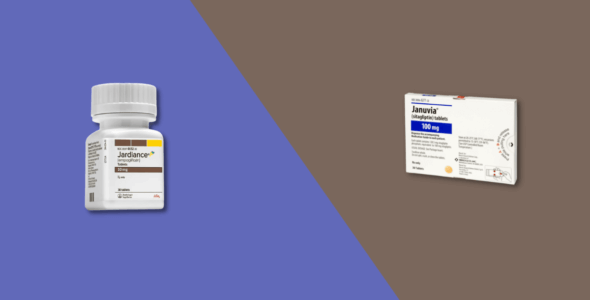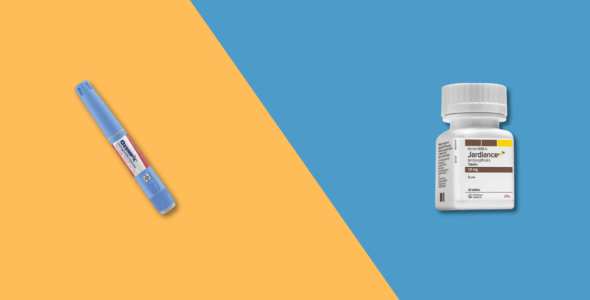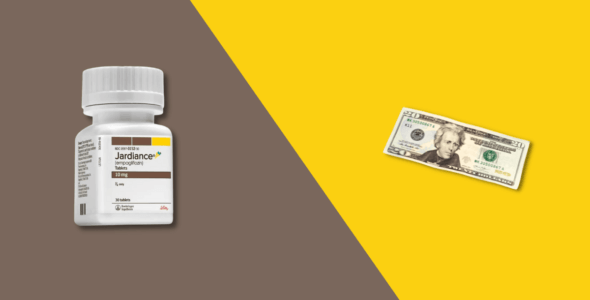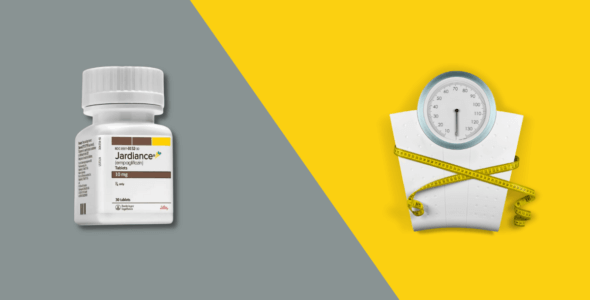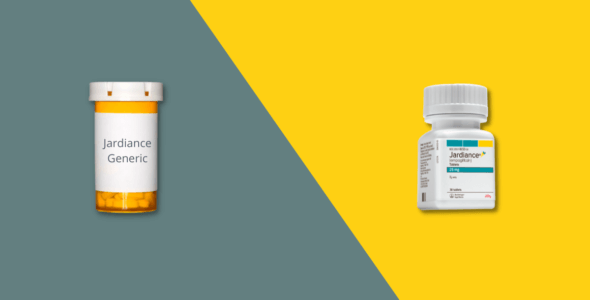Jardiance alternatives: which other diabetes medication can I take?
Table of contents
Jardiance is used to control blood glucose levels and protect the heart in people with type 2 diabetes mellitus. It is often prescribed with other diabetes drugs such as metformin. It belongs to the drug class known as Sodium-Glucose coTransporter-2 inhibitors (SGLT-2 inhibitors).
Jardiance can cause adverse effects as all medications require dose adjustments in patients with kidney disease. If you are looking for alternatives to Jardiance it’s important to talk to a healthcare professional for medical advice and they will use the American Diabetes Association guidelines to make decisions on which medications may best for you. But here is a quick rundown on what is available to help kick start that discussion with your doctor.
What is Jardiance?
Jardiance is a medicine prescribed to adults with type 2 diabetes. It’s used to
- Reduce blood sugar levels (when used alongside exercise and diet changes)
- Reduce the risk of cardiovascular death in adults with type 2 diabetes and heart disease
- Reduce the risk of cardiovascular death or hospitalization for heart failure in adults with heart failure and reduced ejection fraction
Jardiance can help you lower your blood sugar levels when taken alongside dietary and lifestyle changes. It causes you to excrete more sugar in your urine than you would normally. This lowers your blood sugar and helps to reduce your risk of health conditions like cardiovascular disease. Jardiance comes as a tablet you swallow with water.
Jardiance active ingredients
The active ingredient in Jardiance is called empagliflozin. It lowers your blood sugar levels by causing you to lose more sugar in your urine than you usually would.
Your kidneys normally help recycle sugar back into your blood from your urine, with the help of a protein called Sodium-Glucose coTransporter-2 (SGLT-2). Empagliflozin is an inhibitor of this protein, reducing how much sugar your kidneys recycle. This makes you lose more sugar in your urine, rather than it being absorbed back into your blood.
Side effects of Jardiance
As is the case with most medications, Jardiance side effects can occur. You might not experience any, but the most common side effects can include:
- Genital yeast infections (thrush) in both men and women
- Needing to urinate more often and urinating more than usual
- Feeling more thirsty than usual
- Joint pain
- Weight loss
- An increase in cholesterol levels
In rare instances, Jardiance can cause more serious side effects, including:
- Severe allergic reactions to the medication
- A rare but serious bacterial infection that damages tissue under the skin (necrotizing fasciitis) in the area between the anus and genitals (perineum)
- Diabetic ketoacidosis, a potentially life-threatening condition where your body breaks down too much fat too quickly, causing you to produce high levels of blood acids called ketones
- Hypoglycemia (low blood sugar) – particularly when used with other medications like insulin or sulfonylurea
- An increased risk of serious urinary tract infections
- A high and potentially harmful increase in your cholesterol levels
- Dehydration
- Low blood pressure
Jardiance drug interactions
Jardiance can also interact with other medications, which can limit its effectiveness, including:
- Any other diabetes medications, like insulin or sulfonylureas
- Other medications that can lower your blood sugar levels, like diuretics, corticosteroids, estrogens, oral contraceptives, nicotinic acid, and calcium channel blocking drugs
Jardiance warnings & precautions
Don’t take Jardiance if you:
- Are allergic to the active ingredient empagliflozin
- Are allergic to any of the other ingredients in Jardiance
- Have type 1 diabetes
- Are under 18 years of age
Talk to your doctor before taking Jardiance if you:
- Have any liver or kidney problems
- Have or have ever had problems with your pancreas, like pancreatitis or surgery on your pancreas
- Have a history of urinary tract infections or any problems with urination
- Often drink alcohol, or drink a lot of alcohol in a short period of time (“binge” drinking)
- Are going to have surgery in the near future
- Are eating less than usual or have changed your diet
- Are pregnant or are planning to become pregnant
- Are breastfeeding or are planning to breastfeed
Get your diabetes medication for only $49 per month
Get StartedAlternatives to Jardiance
Januvia
Januvia belongs to a class of drugs called dipeptidyl peptidase-4 (DPP-4) inhibitors. It is a prescription medicine used to:
- Treat type 2 diabetes, by helping to lower blood sugar levels when used in combination with exercise and changes to your diet
Januvia is taken as a pill that’s swallowed, usually once a day in the following doses: 25 mg, 50 mg, and 100 mg.
If you have type 2 diabetes, your body may not produce enough insulin or your body may become resistant to the effects of insulin. This means less sugar is removed from your blood and your blood sugar levels stay too high. High blood sugar levels can cause a range of problems over time, including nerve damage, heart disease, strokes, and kidney failure.
Januvia treats type 2 diabetes by helping to lower your blood sugar levels. It encourages your pancreas to continue producing insulin for longer after you’ve eaten, helping your body absorb more sugar out of your blood.
The active ingredient in Januvia is called sitagliptin. It works by increasing the amount of insulin you produce after you’ve eaten.
When you digest food, your stomach and gut produce digestive hormones called GLP-1 and GIP. These hormones make your pancreas secrete insulin. As you continue to digest your food, the digestive hormones are broken down by an enzyme called DPP-4 to allow your levels of insulin to fall again.
Sitagliptin stops the DPP-4 enzyme from breaking down the digestive hormones. This keeps the hormones active for longer, making you produce more insulin, and lowering your blood sugar to normal levels.
Victoza
Victoza belongs to a class of drugs called glucagon-like peptide-1 agonists (GLP-1) and contains the active ingredient liraglutide. Victoza is injected under the skin and can be bought in easy-to-use self-injecting pen devices. It’s usually prescribed when people with type 2 diabetes can’t control their blood sugar through diet and exercise alone, or if their diabetes medication isn’t effective. Victoza can be used instead of other diabetes medicine, or alongside some diabetes medicines. This medication can also be used to reduce the risk of heart problems in people who have both type 2 diabetes and heart disease.
When you eat and digest food, sugar is released into your blood so it can be transported around your body. Your body absorbs the sugar out of your blood, returning your blood sugar to normal levels. In people with diabetes, their bodies struggle to control their blood sugar levels. Often their blood sugar is too high, and over time this can cause a range of problems, including nerve damage and heart disease. When injected, Victoza helps people with type 2 diabetes control their blood sugar levels in three ways:
- It helps your pancreas produce more insulin
- It reduces how quickly food moves through your stomach, slowing down the release of sugar into your blood
- It helps to stop your liver from releasing too much sugar into your blood
Most diabetes treatments, especially ones you inject, are a type of insulin. Insulin is a natural hormone your body produces to help absorb sugar and control your blood sugar levels. However, Victoza isn’t a type of insulin. When injected, it causes your pancreas to naturally release more insulin if your blood sugar is high. As your blood sugar falls, the amount of insulin released reduces, until you’re back to a normal blood sugar level.
Trulicity
Trulicity is a brand-name drug manufactured by Eli Lilly. It belongs to the same drug class as Victoza. It is an FDA-approved prescription drug for adults who have type 2 diabetes. It helps to:
- Reduce blood sugar levels, when used alongside exercise and dietary changes
- Reduce the risk of serious heart problems, such as strokes or heart attacks in people with heart disease or in those who have risk factors for cardiovascular disease
If you have type 2 diabetes, you may not produce enough insulin, or you may even become resistant to insulin. If this happens, you will absorb less sugar from your blood, resulting in high blood sugar levels.
Trulicity can help you lower your blood glucose. It encourages your pancreas to secrete more insulin and reduces how much sugar is released into your blood. This can help to reduce your diabetes symptoms and the likelihood of developing other serious health conditions if taken alongside changes to your daily life like increasing exercise and having a healthier diet.
Trulicity is classed as a peptide-1 receptor agonist. The active ingredient dulaglutide is absorbed into your digestive system which has two effects. It binds with areas on some of your cells called glucagon-like peptide-1 (GLP-1) receptors. This encourages your pancreas to make more insulin, allowing cells in your body to more effectively remove sugar from your blood. At the same time, dulaglutide also reduces how much sugar your pancreas allows to be released into your blood. The combination of these two processes can reduce your blood sugar levels.
Byetta
Byetta is from the same drug class as Trulicity and Victoza. It is an injectable prescription medication given to adults with type 2 diabetes. It can help to lower blood glucose levels when taken alongside exercise and dietary changes. You take Byetta by injecting it under your skin (subcutaneous injection) using a pre-filled, self-injecting pen, usually twice a day before your two main meals.
Byetta works by encouraging your pancreas to produce more insulin and reducing how much glucose your liver secretes into your blood. Byetta does this while you are digesting food, helping to stop your blood glucose from rising too high when you most need it. Byetta becomes less active when you stop digesting and your blood glucose falls, helping to stop your blood sugar from falling too low (hypoglycemia).
The active ingredient in Byetta is called exenatide. It is a type of drug called an incretin mimetic that mimics digestive hormones, called incretins, that your body releases when you digest food. Exenatide works by having the same effects on your body as incretin digestive hormones. When you are digesting food and glucose is released into your blood, exenatide encourages:
- Your pancreas to produce more insulin
- Your pancreas to produce less of a hormone called glucagon that makes your liver release stored glucose into your blood
- Food to move more slowly through your digestive system, causing glucose to be released from your food slower
These three effects can cause your blood glucose levels to fall as you are digesting food. Exenatide stops being as active when you are not digesting food, which can help stop your blood glucose levels from falling too low.
There is also evidence that exenatide can reduce your appetite, helping you lose weight gradually as you use it, and that it can lower your cholesterol levels over time too. This can also help treat your type 2 diabetes.
Invokana
Invokana is from the same class of drugs as Jardiance so will work in a similar way. It is a medication used to treat type 2 diabetes. It’s usually prescribed together with exercise and dietary changes to help manage blood sugar levels. Invokana helps with type 2 diabetes by increasing the amount of sugar that’s removed from your body in your urine. This helps to keep your blood sugar levels lower. Invokana is taken orally as a tablet swallowed with water.
The active ingredient in Invokana is called canagliflozin. It helps to lower your blood sugar by blocking a process in your body that reabsorbs sugar from your urine. This increases the amount of sugar in your urine and causes you to lose more than you would normally do when you urinate. Used alongside exercise and improvements in your diet, and sometimes other diabetes medications, canagliflozin can help you maintain a lower blood sugar level.
Glucophage (Metformin)
Metformin is a diabetes medication belonging to the drug class called biguanides. Metformin helps to reduce or control the amount of sugar in your blood. It can help with weight loss, while nearly all other diabetes drugs cause weight gain. It is especially useful for diabetic patients struggling with obesity.
Metformin is given to adults and children 10 years of age or older, diagnosed with Type 2 diabetes mellitus to:
- Increase glycemic control as an adjunct to diet and exercise
Metformin is an oral medication taken as a liquid, tablet, or extended-release tablet.
The liquid form is usually taken with meals one or two times a day. The regular tablet is usually taken with meals two or three times a day. The extended-release tablet is usually taken once daily with the evening meal.
The tablets are available in five strengths:
- 500 mg, 625 mg, 750mg, 850mg and 1000mg
The recommended starting dose of Metformin hydrochloride tablets is 500 mg orally twice a day or 850 mg once a day, given with meals. Your healthcare provider will advise you on what dosing regime is suitable for you.
Metformin works in three ways:
- It reduces the amount of glucose absorption from your food
- It reduces the amount of glucose made by your liver
- It increases your body’s response to insulin
Metformin is a very useful drug in that it reduces high blood sugar but does not cause hypoglycemia in patients with type 2 diabetes who are not taking insulin injections. It can do this because it does not increase your insulin production like many other diabetes medications.
Is there a cheaper alternative to Jardiance?
While there is no generic Jardiance currently available in the United States at this time, there are other cheaper alternatives to Jardiance that have generic equivalents available, including Glucophage (metformin), Starlix (nateglinide), Glyset (miglitol), Precose (acarbose), Glucotrol XL (glipizide extended release). Speak with your doctor to determine if any of these alternatives are medically appropriate for you.
Final word
Treatment of type 2 diabetes can be overwhelming as there are so many medications and combinations of medications available. Other alternatives to Jardiance include Tradjenta (linagliptin), Farxiga (dapagliflozin), Actos (pioglitazone), Glucotrol (glipizide), and Onglyza (saxagliptin) Your doctor can provide you with more information. Always inform your healthcare provider of your medical conditions, and any medications you are taking including over-the-counter meds and supplements.
Medically reviewed
A medical professional has reviewed this article.


Jamie Winn, PharmD
Jamie Winn, PharmD
Dr. Jamie Winn received his Doctor of Pharmacy in 2002 from the University of South Carolina College of Pharmacy, Columbia, SC. Jamie is a medical reviewer for NiceRx.

